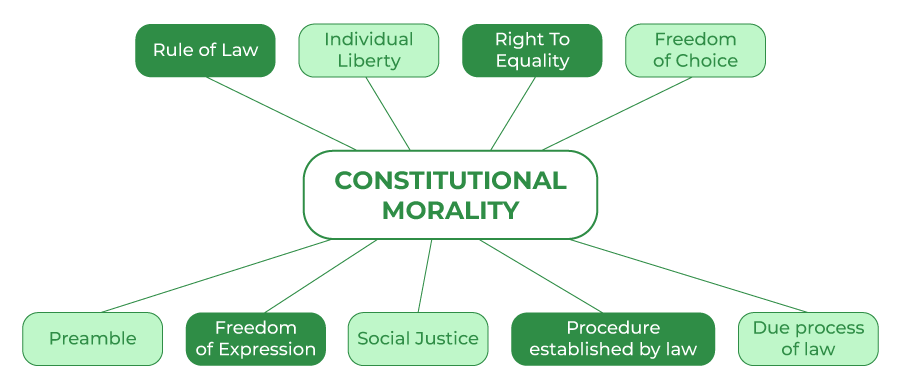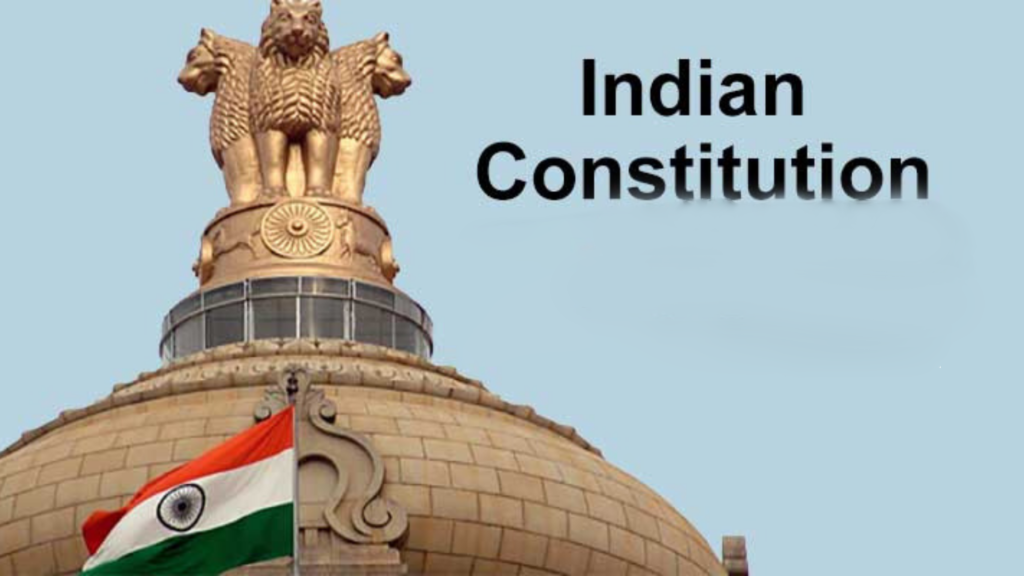
Project On Constitutional Values For Class 12
Acknowledgement:
I am deeply grateful to the individuals who have contributed to the successful completion of this project on Constitutional Values. Their guidance, support, and encouragement have played a crucial role in shaping this work and enhancing its quality.
First and foremost, I would like to express my sincere appreciation to my teachers and mentors for their unwavering support throughout this project. Their profound knowledge, expertise, and insightful suggestions have been invaluable in guiding me through the process. They have not only imparted their subject matter expertise but have also nurtured my critical thinking and analytical skills, enabling me to delve deeper into the significance of Constitutional Values. Their continuous encouragement and belief in my abilities have motivated me to strive for excellence.
I would also like to extend my heartfelt gratitude to my parents for their unwavering support and encouragement. Their belief in my capabilities and their constant motivation have been instrumental in keeping me focused and determined throughout the project. Their unwavering support has been a pillar of strength, and I am immensely grateful for their sacrifices and dedication towards my education.
I would like to acknowledge the contributions of my classmates and friends who have been a source of inspiration and provided valuable insights during discussions on Constitutional Values. Our brainstorming sessions and exchange of ideas have enriched my understanding of the topic and broadened my perspective.
Additionally, I would like to express my gratitude to the authors, scholars, and experts whose works and research I have referred to during the project. Their valuable contributions have served as a guiding light, providing me with a deeper understanding of the subject matter and enabling me to present comprehensive information.
Last but not least, I extend my gratitude to the administration and staff of my educational institution for providing the necessary resources and a conducive environment for learning. Their efforts in fostering an atmosphere of academic excellence have been crucial in the successful completion of this project.
Once again, I extend my sincere appreciation to all those who have contributed to this project directly or indirectly. Your support, guidance, and encouragement have been indispensable, and I am truly grateful for your valuable contributions.
Introduction:
The Constitution of a country serves as a cornerstone of its governance system, providing the framework upon which the nation operates. It is a comprehensive document that outlines the structure of the government, delineates the powers and responsibilities of various branches, and safeguards the rights and freedoms of its citizens. At the heart of every constitution lies a set of Constitutional Values, which are the guiding principles and ideals that reflect the collective aspirations and vision of the nation.
Constitutional Values are the fundamental beliefs and principles that underpin the functioning of a democratic society. These values serve as the moral compass, shaping the laws, policies, and actions of the government. They establish the standards for justice, equality, and liberty, ensuring that all individuals within the nation are treated fairly, have equal opportunities, and enjoy basic human rights.
Justice is a paramount Constitutional Value that ensures the fair treatment of individuals and upholds the rule of law. It encompasses the notion of impartiality, where everyone is equal before the law and entitled to due process. Justice ensures that the legal system functions in a transparent, accountable, and unbiased manner, protecting the rights of both the vulnerable and the powerful.
Equality is another essential Constitutional Value that guarantees equal treatment and opportunities for all individuals, irrespective of their race, religion, gender, caste, or socioeconomic background. It strives to eliminate discrimination and ensures that every citizen has equal access to resources, services, and opportunities to fulfill their potential.
Liberty, a cherished value in democracies, encompasses the freedom of speech, expression, belief, association, and movement. Constitutional Values protect the individual’s right to express their thoughts, ideas, and opinions freely, without fear of repression or censorship. Liberty enables citizens to actively participate in the democratic process, fostering a vibrant and inclusive society.
Moreover, Constitutional Values encompass the principles of secularism, which ensure the separation of religion and state. By guaranteeing religious freedom and promoting a secular outlook, constitutional values protect the rights of individuals to practice their faith or choose to be irreligious, while preventing the state from favoring or discriminating against any particular religion.
Constitutional Values are not static but evolve with societal changes, reflecting the progressive aspirations of the nation. They act as a guiding force, helping to resolve conflicts, protect minority rights, and shape public policies that align with the principles of justice, equality, and liberty.
In conclusion, Constitutional Values form the bedrock of a democratic society, providing a framework for governance and safeguarding the rights and freedoms of citizens. Justice, equality, liberty, and secularism are some of the key principles that constitute these values. By upholding and cherishing Constitutional Values, nations can strive towards creating an inclusive, just, and harmonious society for all its members.

Constitutional Values: Meaning and Significance:
Constitutional Values are the fundamental principles and ideals enshrined in a constitution that serve as the guiding framework for a nation’s governance. They outline the moral and ethical foundation upon which the government operates and the rights and freedoms it guarantees to its citizens. These values play a significant role in shaping the legal, social, and political landscape of a country.
At the core of Constitutional Values is the principle of democracy, which upholds the idea of popular sovereignty, where power lies with the people. Democracy ensures that the government is elected by the citizens and accountable to them. It promotes citizen participation, representation, and the protection of individual and collective rights.
Justice is another crucial Constitutional Value that ensures fairness, impartiality, and the rule of law. It encompasses both procedural and substantive justice, ensuring that legal processes are transparent, equitable, and accessible to all. Moreover, justice ensures that laws and policies are enacted and enforced in a manner that upholds the rights and dignity of every individual.
Equality, as a Constitutional Value, aims to eliminate discrimination and create a level playing field for all citizens. It prohibits unfair treatment based on factors such as race, religion, gender, caste, or socioeconomic status. The principle of equality ensures that everyone has an equal opportunity to succeed, access to resources and services, and protection from discrimination.
Secularism is another vital Constitutional Value that emphasizes the separation of religion and state. It guarantees religious freedom for individuals, allowing them to practice and express their faith without interference from the government. Secularism ensures that the state remains neutral in matters of religion, treating all individuals and communities equally, regardless of their religious beliefs.
Fraternity, also known as brotherhood, is a Constitutional Value that promotes unity, solidarity, and a sense of belonging among the citizens. It encourages a spirit of empathy, cooperation, and collective responsibility towards the welfare of the nation. Fraternity fosters social harmony, respect for diversity, and the promotion of the common good.
The significance of Constitutional Values lies in their ability to provide a stable and just governance system. They act as a check on the exercise of power by the government, ensuring that it operates within the boundaries set by the constitution. Constitutional Values guide the interpretation and application of laws, protecting the rights and freedoms of individuals and preventing the abuse of power.
Moreover, Constitutional Values reflect the shared aspirations and vision of a nation. They provide a moral compass for society, setting the standards of behavior and promoting a culture of respect, tolerance, and inclusivity. These values foster a sense of identity, unity, and national integrity, strengthening the social fabric of the country.
In conclusion, Constitutional Values are the core principles embedded in a constitution that guide the functioning of the government, protect individual rights, and promote social harmony. Democracy, justice, equality, secularism, and fraternity are some of the key values that shape the legal, social, and political landscape of a nation. Upholding and cherishing these values is essential for the well-being, progress, and inclusive development of a society.

Examples of Constitutional Values:
Equality: The principle of equality ensures that all individuals are treated with fairness and without discrimination. It prohibits any form of discrimination based on caste, creed, gender, or religion.
Liberty: Constitutional values uphold the freedom of speech, expression, and belief, allowing individuals to express their opinions and pursue their interests without undue interference.
Justice: The principle of justice ensures that all individuals, irrespective of their social or economic background, have equal access to the legal system and are treated fairly.
Secularism: Constitutional values promote secularism, ensuring that the state remains neutral towards religion and respects the rights of individuals to practice and propagate their faith freely.
Fraternity: Fraternity signifies the spirit of brotherhood and unity among all citizens, fostering a sense of belonging and collective responsibility towards the nation.
Importance of Constitutional Values:
Constitutional Values play a vital role in the functioning of a just and inclusive society. They serve as the guiding principles that underpin the governance system and protect the rights and freedoms of individuals. The importance of Constitutional Values can be understood from the following perspectives:
- Framework for Governance: Constitutional Values provide a framework for governance, outlining the principles and rules by which a nation is governed. They establish the structure of government, define the powers and responsibilities of different branches, and lay down the procedures for decision-making. By adhering to these values, the government operates within a transparent and accountable framework, ensuring that the interests of the citizens are protected.
- Protection of Individual Rights: Constitutional Values serve as a shield to safeguard the rights and freedoms of individuals. They establish a legal framework that guarantees fundamental rights, such as the right to life, liberty, equality, freedom of speech, and religious freedom. By upholding these values, the constitution ensures that every individual is treated with dignity and has equal opportunities and protections under the law.
- Ensuring Justice and Equality: Constitutional Values are crucial in upholding principles of justice and equality. They establish the rule of law, ensuring that everyone is subject to the same legal standards and that justice is administered fairly and impartially. Constitutional Values prohibit discrimination and promote equal treatment for all individuals, irrespective of their race, religion, gender, or socioeconomic background. By ensuring justice and equality, Constitutional Values contribute to social harmony, cohesion, and the prevention of social tensions and conflicts.
- Fostering Social Harmony and National Integration: Constitutional Values provide a common set of principles that promote social harmony and national integration. By upholding values such as secularism, fraternity, and equality, the constitution encourages respect for diversity and unity among citizens. Constitutional Values serve as a unifying force, bridging societal divisions and promoting a sense of belonging and collective identity. They foster a shared commitment to the ideals of justice, equality, and liberty, contributing to the overall stability and cohesion of the nation.
- Smooth Functioning of Democratic Institutions: Constitutional Values are essential for the smooth functioning of democratic institutions. They establish the fundamental principles of democracy, such as popular sovereignty, separation of powers, and checks and balances. Constitutional Values ensure that government institutions operate within the boundaries of the constitution and respect the rights and freedoms of citizens. They provide the necessary safeguards against the abuse of power and help maintain the integrity and effectiveness of democratic processes.
In conclusion, Constitutional Values are of paramount importance in maintaining a just and inclusive society. They provide a framework for governance, protect individual rights, ensure justice and equality, foster social harmony, and contribute to the smooth functioning of democratic institutions. Upholding and promoting these values is crucial for building a society that upholds the principles of equality, justice, and liberty, and works towards the well-being and progress of its citizens.

How Can We Promote Constitutional Values?
Promoting Constitutional Values requires active participation from every citizen. Here are a few ways to make it happen:
Education and Awareness: Encourage educational institutions to include lessons on constitutional values in their curriculum. Conduct workshops and seminars to create awareness among students and the general public.
Civic Engagement: Engage in constructive dialogue and debates on constitutional issues. Participate in public forums, town hall meetings, and peaceful demonstrations to express your views and contribute to policy discussions.
Responsible Citizenship: Act as responsible citizens by respecting the rights and dignity of others, abiding by the laws of the land, and actively participating in the democratic process, such as voting and exercising freedom of speech.
Legal Literacy: Enhance legal literacy by organizing legal awareness campaigns to educate people about their rights and the importance of constitutional values.
Role of Media: Encourage media outlets to responsibly disseminate information and promote constitutional values by highlighting instances of injustice, discrimination, and violations of individual rights.
Three Pillars of Constitutional Values:
Legislature: The legislature, comprising elected representatives, plays a vital role in enacting laws that uphold constitutional values. It is responsible for framing and amending legislation in line with the principles enshrined in the constitution.
Judiciary: The judiciary acts as the guardian of the constitution, ensuring the enforcement of constitutional values and protecting citizens’ rights. It interprets the law, resolves disputes, and safeguards the principles of justice and equality.
Executive: The executive branch, headed by the government, is responsible for implementing laws and policies that uphold constitutional values. It must exercise its powers within the framework of the constitution and respect the rights and freedoms of individuals.
Conclusion:
Constitutional Values are the foundation upon which a democratic society is built. They serve as the guiding principles that shape the governance, protect individual rights, and foster social harmony. Upholding and promoting these values is not only the duty of the government but also the responsibility of every citizen.
By adhering to Constitutional Values, we ensure that our society operates on the principles of justice, equality, and liberty. These values provide a framework that prevents the abuse of power, ensures the rule of law, and protects the rights and freedoms of all individuals, regardless of their background.
Nurturing and embracing Constitutional Values is essential for creating a just and inclusive society. It requires active participation from every citizen, as each individual has the power to contribute to the promotion of these values. By respecting the rights and dignity of others, engaging in meaningful dialogue, and actively participating in the democratic process, we can uphold Constitutional Values and work towards their realization.
Promoting Constitutional Values leads to the establishment of a society that values diversity, respects differing opinions, and fosters social harmony. It encourages inclusivity, unity, and a sense of collective responsibility. By upholding Constitutional Values, we build a society that values justice, equality, and liberty for all, ensuring that every individual has the opportunity to thrive and contribute to the betterment of the nation.
In conclusion, Constitutional Values are not just words on paper but the moral compass that guides our society. By upholding and embracing these values, we lay the foundation for a just, inclusive, and progressive society that respects the rights and dignity of all its citizens. It is our collective responsibility to promote and uphold Constitutional Values, as they are the pillars upon which a vibrant and thriving democratic society stands.
Certificate of Completion
[Student’s Name][Class/Grade Level]This is to certify that I, [Student’s Name], a [Class/Grade Level] student, have successfully completed the project on “Project On Constitutional Values For Class 12.” The project explores the fundamental principles and key aspects of the chosen topic, providing a comprehensive understanding of its significance and implications.
In this project, I delved into in-depth research and analysis, investigating various facets and relevant theories related to the chosen topic. I demonstrated dedication, diligence, and a high level of sincerity throughout the project’s completion.
Key Achievements:
Thoroughly researched and analyzed Project On Constitutional Values For Class 12.
Examined the historical background and evolution of the subject matter.
Explored the contributions of notable figures in the field.
Investigated the key theories and principles associated with the topic.
Discussed practical applications and real-world implications.
Considered critical viewpoints and alternative theories, fostering a well-rounded understanding.
This project has significantly enhanced my knowledge and critical thinking skills in the chosen field of study. It reflects my commitment to academic excellence and the pursuit of knowledge.
Date: [Date of Completion]Signature: [Your Signature] [School/Institution Name][Teacher’s/Examiner’s Name and Signature]
In order to download the PDF, You must follow on Youtube. Once done, Click on Submit
Follow On YoutubeSubscribed? Click on Confirm
Download Project On Constitutional Values For Class 12 PDF






